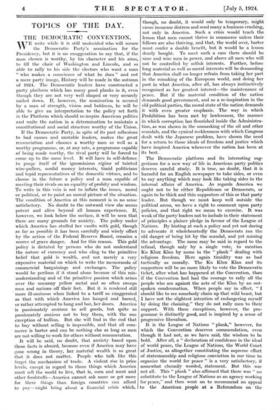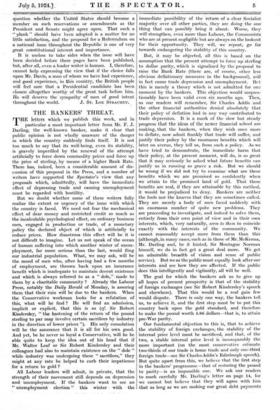TOPICS OF THE DAY.
THE DEMOCRATIC CONVENTION.
WE write while it is still undecided who will secure the Democratic Party's nomination for the Presidency, but it is no exaggeration to say that, if the man chosen is worthy, by his character and his aims, to fill the chair of Washington and Lincoln, and so able to rally to his side the electors who want a man " who makes a conscience of what he does " and not a mere party image, History will be made in the autumn of 1924. The Democratic leaders have constructed a party platform which has many good planks in it, even though they are not very well shaped or very securely nailed down. If, however, the nomination is secured by a man of strength, vision and boldness, he will be able to give an interpretation to the policy set forth in the Platform which should re-inspire American politics and unite the nation in a determination to maintain a constitutional and social structure worthy of the Union.
If the Democratic Party, in spite of its past adhesions to bad causes and unstable leaders, makes the great renunciation and chooses a worthy man as well as a worthy programme, or, at any rate, a programme capable of being made worthy, the rival party will be forced to come up to the same level. It will have in self-defence to purge itself of the ignominious regime of tainted wire-pullers, sordid money interests, timid politicians and tepid representatives of the domestic virtues, and to choose in the future a policy and a man capable of meeting their rivals on an equality of probity and wisdom. To write in this vein is not to inflate the issues, moral or political, or to paint an unreal picture of the situation. The condition of America at this moment is in no sense satisfactory. No doubt to the outward view she seems potent and alive beyond all human experience. If, however, we look below the surface, it will be seen that there are many grounds for anxiety. The policy under which America has stuffed her vaults with gold, though as far as possible it has been carefully and wisely offset by the action of the Federal Reserve Board, remains a source of grave danger. And for this reason. This gold policy is dictated by persons who do not understand the nature of currency and who cling to the primitive belief that gold is wealth, and not merely a very expensive material on which to write the memoranda of commercial bargainings and exchanges. The policy would be perilous if it stood alone because of this mis- understanding and of the primitive passion which arises over the uncanny yellow metal and so often sweeps men and nations off their feet. But it is rendered still more ill-ominous when linked to a tariff so exaggerated as that with which America has banged and barred, or rather attempted to bang and bar, her doors. America is passionately anxious to sell goods, but quite as passionately anxious not to buy them, with the one exception of bullion. But she will find in the end that to buy without selling is impossible, and that all corn- ' coerce is barter and can be nothing else as long as men are not willing to work for others without remuneration.
It will be said, no doubt, that anxiety based upon these facts is absurd, because even if America may have gone wrong in theory, her material wealth is so great that it does not matter. People who talk like this forget the mechanism of trade. A violent rise in price levels, except in regard to those things which America must sell the world to live, that is, corn and meat and other foodstuffs—America cannot ask more or get more for these things than foreign countries can afford to pay—might bring about a financial crisis which. though, no doubt, it would only be temporary, might cause immense distress and send many a business crashing, not only in America. Such a crisis would teach the lesson that men cannot thrive in commerce tmless their fellows are also thriving, and that, the world over, barter must confer a double benefit, but it would be a lesson dearly bought. To meet such a case there should be sane and wise men in power, and above all men who will not be controlled by selfish interests. Further, before long material as well as moral interests will be demanding that America shall no longer refrain from taking her part in the remaking of the European world, and doing her part in what America, after all, has always instinctively recognized as her greatest interest—the maintenance of peace. But if the material condition of the nation demands good government, and so a re-inspiration in the old political parties, the moral state of the nation demands it with even greater emphasis. The way in which Prohibition has been met by lawlessness, the manner in which corruption has flourished inside the Administra- tion, as was shown in the unmasking of the oil and other scandals, and the cynical recklessness with which Congress dealt with the Japanese problem, have shown the need for a return to those ideals of freedom and justice which have inspired America whenever the nation has been at its best.
The Democratic platform and its interesting sug- gestions for a new way of life in American party politics deserve careful study. It is true, no doubt, that it is harmful for an English newspaper to take sides, or even • to say anything which may look like taking sides in the internal affairs of America. As regards America we ought not to be either Republicans or Democrats, or again to be thick and thin supporters of this or that party leader. But though we must keep well outside the political arena, we have a right to comment upon party policies, and that right we mean to exercise. It was weak of the party leaders not to include in their statement of principles a plainer pledge in favour of the League of Nations. By hinting at such a policy and yet not daring to advocate it wholeheartedly the Democrats ran the old danger of being hit by the scandal, and yet missing the advantage. The same may be said in regard to the refusal, though only by a single vote, to mention Ku Klux Klan by name in the " plank " dealing with religious freedom. Here again timidity was as bad tactically as morally. The Ku Klux Klan and its supporters will be no more likely to vote the Democratic ticket, after what has happened at the Convention, than if the Convention had had the courage to rally all the people who are against the acts of the Klan by an out- spoken condemnation. When people say in effect, " I should like to see somebody chain up that wild beast, but I have not the slightest intention of endangering myself by doing the chaining," they do not rally men to their support. With these exceptions, however, the pro- gramme is distinctly good, and is inspired by a sense of progressive liberalism.
It is the League of Nations " plank," however, for which the Convention deserves commendation, even though it had not, as we have said, the wisdom to be bold. After all, a " declaration of confidence in the ideal of world peace, the League of Nations, the World Court of Justice, as altogether constituting the supreme effort of statesmanship and religious conviction in our time to organize the world for peace " is a very satisfactory, if somewhat clumsily worded, statement. But this was not all. This " plank " also affirmed that there was " no substitute to the League of Nations as an agency working for peace," and then went on to recommend an appeal to the American people at a Referendum on the question whether the United States should become a Member on such reservations or amendments as the President and. Senate might agree upon. That .such a " plank " should hive been adopted is a matter for no little satisfaction, and the- proposil for a-Referendum on a national 'issue throughout the Republic- is one of very great constitutional' interest and importance.
It is useless to take .sides when the issue will have been decided before these pages, have been . published, but, after all, even a leader writer is human. I, therefore, cannot help expressing the, view that if the choice upon Mr. Davis, a man of whom we have had experience, and good experience, in this country, the British peOple will feel -sure that a 'Presidential candidate has been chosen -altogether worthy of the great task before him. He will deserve the sympathy of men of good intent
. .



















































 Previous page
Previous page